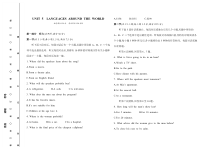 DOC
DOC
【文档说明】05-UNIT5 LANGUAGES AROUND THE WORLD.docx,共(16)页,88.677 KB,由小赞的店铺上传
转载请保留链接:https://www.doc5u.com/view-de7dcaf038d0484da9ecab1137a09348.html
以下为本文档部分文字说明:
姓名班级考号密○封○装○订○线密○封○装○订○线密封线内不要答题UNIT5LANGUAGESAROUNDTHEWORLD全卷满分150分考试用时120分钟第一部分听力(共两节,满分30分)第一节(共5小题;每
小题1.5分,满分7.5分)听下面5段对话。每段对话后有一个小题,从题中所给的A、B、C三个选项中选出最佳选项。听完每段对话后,你都有10秒钟的时间来回答有关小题和阅读下一小题。每段对话仅读一遍。1.Wheredidthespeakerslea
rnaboutthesong?A.Fromamovie.B.Fromatheaterplay.C.FromanEnglishfriend.2.Whatwillthespeakersprobablybuy?A.Arefrigerator.B.Asofa.C.Atelevision.3.Whatd
oesthemansayabouttheprogram?A.Ithashisfavoritemusic.B.It’snotsuitableforhim.C.Childrenathisageloveit.4.Whereisthewomanprobably?A.Atho
me.B.Inacar.C.Inahospital.5.Whatisthefinalpriceofthecheapestcellphone?A.$150.B.$135.C.$299.第二节(共15小题;每小题1.5分,满
分22.5分)听下面5段对话或独白。每段对话或独白后有几个小题,从题中所给的A、B、C三个选项中选出最佳选项。听每段对话或独白前,你将有时间阅读各个小题,每小题5秒钟;听完后,各小题将给出5秒钟的作答时间。每段对话或独白读两遍。听第6段材料,回答第6、7题。6.WhatisSteve
goingtodoinanhour?A.WatchaTVshow.B.Gotothepark.C.Havedinnerwithhisparents.7.Wherewillthespeakersmeettomorrow?A.AtMia’sa
partment.B.Attheconcerthall.C.Atarestaurant.听第7段材料,回答第8至10题。8.Howlongwilltheman’sshowlast?A.For5minutes.B.For10minutes.C
.For20minutes.9.Whatadvicedidthewomangivetothemanbefore?A.Toclosehiseyestobecalm.密○封○装○订○线密○封○装○订○线密
封线内不要答题B.Topretendthepeoplearecabbage.C.Torememberthelinesfromamovie.10.Whatseemstobethewoman’shopefo
rtheman?A.Toenjoyhimself.B.Toimpressthejudges.C.Tomakethecrowdlaugh.听第8段材料,回答第11至13题。11.Howlongistheman’snextrace?A.10km
.B.15km.C.18km.12.Wheredoesthemanturnback?A.Atthezoo.B.Atthepark.C.Atthelake.13.Whathappenedtothemanlastweek?A.Hefelloffabridge.B.Hewashitbyabike.C.
Heinjuredhisleg.听第9段材料,回答第14至17题。14.HowdoesCindygotoworkeveryday?A.Bybus.B.Bysubway.C.Bycar.15.WhendoesCindyreadherbook?A.Onhe
rwaytowork.B.Whenwaitingtoact.C.Atwork.16.Whatpercentofthetimewillanactorspendontheacting?A.About10%.B.About50%.C.About90%.17.WhydoesCindyloveher
job?A.Formoney.B.Forfame.C.Forinterest.听第10段材料,回答第18至20题。18.WhatdifficultydidthespeakerhavewhenstartingtolearnFrench?A.Grammar.B.Vocabulary.C
.Pronunciation.19.WhatdidthespeakerthinkofherFrenchaftershearrivedinFrance?A.Poor.B.Acceptable.C.Excelle
nt.20.Whatisthemostimportantinlearningalanguageaccordingtothespeaker?A.Masteringthegrammarrules.B.Knowingalarge
numberofwords.C.Usingthelanguageinreallife.第二部分阅读(共两节,满分50分)第一节(共15小题;每小题2.5分,满分37.5分)阅读下列短文,从每题所给的A、B、C、D四个选项中选出最佳选项。AFourCoolLang
uages姓名班级考号密○封○装○订○线密○封○装○订○线密封线内不要答题ChineseAround1.4billionpeoplespeakChinese.Chineseisatonal(声调的)language,meaningthatchangingthetoneofjustones
yllable(音节)canaffectaword’smeaning.Chinesewritinghasancientroots,whichisthoughttohavedevelopedaround1400B.C.Arabic(阿拉伯语
)Over370millionpeoplespeakArabic.WrittenArabicusesacursive-stylefont(字体)thatlooksmorelikeartworksthanwriting.
Arabiciswrittenfromrighttoleftratherthanfromlefttoright,makingitdifferentfrommanyotherlanguages.EnglishAround379mill
ionpeoplespeakEnglishasanativelanguage.It’sanofficiallanguageinahugenumberofcountries.Englishisthemostwidelyspok
ensecondlanguage,withoverabillionpeoplespeakingittosomelevelofcompetence.Thatmeansaroundtwiceasmanype
oplespeakingEnglishasasecondlanguageasthosewhospeakitasthefirstlanguage.ItalianNearly68millionpeoplespeakItalian.Ifyouplaymusicorsing,chance
sarethatyoualreadyknowalotofItalianbecausemanyfamiliarmusicaltermsareactuallyItalian.NotonlywilllearningItalianhelpyoupickupvoc
abulary,butitwillalsohelpyouunderstandthemeaningsofmusicaltermsingreaterdepth.21.WhatisafeatureofArabic?A.Itdoesn’thaveacursive-stylefont.B.It
helpsartistswiththeirartworks.C.Itiswrittenfromrighttoleft.D.Itiscloselyrelatedtomusic.22.Whichismostwidelyusedasasecondlanguageintheworld?A.Arabic
.B.English.C.Chinese.D.Italian.23.What’sthenumberofpeoplewhospeakItalian?A.Nearly68million.B.Around370milli
on.C.Over379million.D.Around1.4billion.BBeingdeafinthehearingworldcanleadtopainfulfeelingsofisolation(孤独).WaitressKelseyrecentlysh
aredanexperienceonsocialmediasharingsitethatzoomedtothetopofthefrontpageoftheInternet.Inherbriefpost,Kelseyexplainedthatshewaitedtablesatab
arduringtheevenings,andonenightshenoticedadeafmansittingaloneinhersection.WhenKelseyisn’tworkingatthebar,sheearnsgoodhourlypaydoingsignlang
uageinterpretation(手语翻译),soshesensedanopportunitytouse密○封○装○订○线密○封○装○订○线密封线内不要答题herskilltomakethiscustomerfeelalittl
elessaloneintheworld.Sheapproachedhistableandbeganchattingwithhiminsignlanguage.Whenthetablenexttothema
n’snoticedtheirsilentconversation,theyaskedKelseyhowlongshe’dbeensigning.Theyhadabriefconversationabouthergoalofbecomin
gqualifiedtointerpretsignlanguageinamedicalormentalhealthsetting.Shedidn’tthinkmuchaboutthewholeexchangeuntilthecustomershadleftthebarandshe
wastidyingupthetables.There,onthetableofthecustomerswho’dseenhersignlanguageconversationwiththedeafman,wasahandwrittennote.“Thankyouforwhatyoudid;
itabsolutelymatters!”thenotesaid.“Goodluckwithfinishingyourdegree!”Besidesthat,they’dlefthera$100tip.Kelseywasmovedbythekindnote,especiallybecau
seshewasn’tdoinganythingoutoftheordinary.Toher,shewasjustconversingwithsomeoneinalanguagethatonlyheun
derstood.Yettothedeafmanandthepeopleseatednexttohim,she’dbridgedagapandhelpedsomeonewhoprobablyfeelslonelyalotof
thetime.KelseysharedthenoteontheInternettospreadmoreloveandlightintheworld.24.WhatdoweknowaboutKelsey’
sworkatthebar?A.Itisherpart-timejob.B.Itgoesbeyondherability.C.Itrequireshertoworkalldaylong.D.Itoffersherachancetolearnsignlanguage.25.W
hatcanweinferaboutthedeafman?A.HeleftKelsey$100asatip.B.Hecouldusesignlanguage.C.HefoundithardtocommunicatewithKelsey.D.Hewasafriendofthecust
omers,nexttohim.26.WhatdidthecustomersnexttothedeafmanthinkofKelsey?A.Shewaswastingtimeworkingasawaitress.B.Shen
eededtostudyfurtherforadegree.C.SheshouldusetheInternetasatool.D.Shewassokindtoservethoseinneed.27.WhatlessoncanwelearnfromKelsey’sexperience?
A.Practicemakesperfect.B.Itisnevertoolatetolearn.C.Kindnessisrepaidwithkindness.D.WheninRome,doastheRomansdo.COnline,Englishhasb
ecomeacommonlanguageforusersfromaroundtheworld.Intheprocess,thelanguageitselfischanging.Therearenow姓名班级考号密○封○装○订○线密○封○装○订○线密封线内不要答题thoughttobesome
4.5billionwebpagesworldwide.Somelanguageexpertspredictthatwithin10yearsEnglishwilloccupytheInternet—butinformsthatwillbeverydifferen
ttowhatweacceptandrecognizeasEnglishtoday.That’sbecausepeoplewhospeakEnglishasasecondlanguagealreadyoutnumbernativespeakers.Andincreasingly,theyusei
ttocommunicatewithothernon-nativespeakers,particularlyontheInternetwherelessattentionispaidtogrammarandspellingandusersdon’thavetowor
ryabouttheiraccent(口音).UsersofFacebookalreadysocializeinanumberofdifferent“Englishes”,includingIndianEnglish,SpanishEnglishandKoreanEnglish.While
thesedifferentstyleshavelongexistedwithintheircultures,they’renowexpandingandcomingonline.Technologycompaniesareintroducin
gnewly-developedEnglishwordswithproductsaimedatenablinguserstoaddwordsthatarenotintheEnglishdictionary.Andmostlargec
ompanieshaveEnglishwebsites,whilesmallerbusinessesarelearningthattheyneedacommonlanguage—English—toreachg
lobalcustomers.TheincreasingpopularityoftheInternetallowsmorelanguagestodevelopquickly.“Mostpeopleactuallyspeakseverallanguages—it’slesscom
montospeakonlyone,”saysMr.Munro.“Englishhastakenitsplaceastheworld’scommonlanguage,butit’snotpushingoutotherlanguages.”Inst
ead,otherlanguagesarepushingtheirwayintoEnglish,intheprocesscreatingsomethingnew.28.Whichofthefollowingi
strueaboutonlinecommunication?A.Peopleneedtospellexactly.B.Grammarisnotsoimportant.C.Peopleneedtopayatten
tiontotheiraccent.D.MostEnglishspeakersarenativespeakers.29.Whatcanweinferfromthetext?A.Wecanonlycommuni
cateonlineinEnglish.B.It’simpossibletofindalltheEnglishwordsinthedictionary.C.SometechnologycompaniesstarttopublishEngli
shdictionaries.D.SmallerbusinessesarenotallowedtohaveEnglishwebsites.30.WhatcanwelearnfromwhatMr.Munrosays?A.Otherlanguagesareenrichi
ngEnglish.B.Onecan’tlivewellwithoutspeakingseverallanguages.C.Englishwillbecometheonlylanguageintheworld.D
.Chineseusedtobetheworld’scommonlanguage.31.Whatdoesthetextmainlytalkabout?A.Englishisacommonlanguagearoundtheworld.B.Therearenowmany
differentlanguagestyles.密○封○装○订○线密○封○装○订○线密封线内不要答题C.EnglishisdevelopingwiththeInternet.D.Smallerbusinessesarelearningacommonlanguag
e.DTouristsvisitingLaGomeraandEIHierrointheCanaryIslandscanoftenhearthelocalscommunicatingoverlongdistancesbywhistling—notatune(曲调),buttheSpan
ishlanguage.ThelocalsarecommunicatinginSilbo,awhistledSpanishlanguage.Whistledlanguagesarealmostdevelopedinrough,mountainousareas
orinthethickforest.Asaresult,whistledspeechcanbeunderstoodupto10timesasfarawayasordinaryshouting.Thatletspeoplecommunicateevenwhentheyc
annoteasilystandcloseenoughtoshout.OnLaGomera,forexample,afewtraditionalshepherds(牧羊人)stillwhistletooneanotheracrossmountainvalleysthatcouldtakehour
stocross.Whistledlanguagesworkbecausemanyofthekeyelementsofspeechcanbeproducedinawhistle,saysMeyer,linguisto
fCNRS.Wetellonespeechsoundfromanotherbysmalldifferencesintheirsoundfrequencypatterns.Along[iː],forex
ample,isformedhigherinthemouththanalong[ɔː],givingitahighersound.Tolanguagescientists,suchlanguagesaremorethanjustacuriosity.
Bystudyingwhistledlanguages,theyhopetolearnabouthowourbrainsgetmeaningfromthecomplexsoundpatternsofs
peech.Whistlingmayevenprovideachancetoknowoneofthemostdramaticforwardjumpsinhumanevolution(进化):theoriginoflanguag
eitself.Despitetheirinteresttobothlanguageexpertsandcasualobservers,whistledlanguagesaredisappearingrapidlyal
lovertheworld,andsome,suchasthewhistledformoftheTepehualanguageinMexico,havedisappeared.“Nowyoucanfindwhistledspeechonlyinp
lacesthatarevery,veryremote,andhavehadlesscontactwithmodernityandlessaccesstoroads,”saysMeyer.Fortunately,thereisstillhope.UNE
SCO,theUNculturalorganization,haslistedtwowhistledlanguages,SilboandakindofwhistledTurkish,astheworld’sculturalheritage.Suchattentioncanleadto
conservationefforts.32.Whatledtothedevelopmentofwhistledlanguages?A.Geographicinaccessibility.B.Rapidin
creaseintourism.C.Greaterinformationcapacity.D.Interestoflanguageexperts.33.Whyarealong[iː]andalong[ɔː]mentionedinParagraph3?A.Toshowwhatkeyele
mentsspeechhas.B.Toexplainthedifferencesbetweenspeechsoundfrequencypatterns.C.Toprovethepopularityofwhistledlanguagesintheworl
d.D.Toshowthedisadvantagesofwhistledlanguages.姓名班级考号密○封○装○订○线密○封○装○订○线密封线内不要答题34.Whatmightbeareasonforthedisapp
earanceofwhistledlanguagesaccordingtoMeyer?A.Difficultyinunderstanding.B.Lackofattention.C.Expansionofothercultures.D.Modernizat
ion.35.Whatdoestheunderlinedword“conservation”meaninthelastparagraph?A.Impression.B.Experiment.C.Protection.D.Graduation.第二节(共5小题;每小题2.5分,满分12.
5分)阅读下面短文,从短文后的选项中选出可以填入空白处的最佳选项。选项中有两项为多余选项。Sometimeswhenwearelearninganewlanguageitcanbereallyfrighteningtostartspeakingit
withotherpeople.36,asitwillhelpusgainconfidenceinourselves.Herearesomegreattipsthatcanhelpyouovercomeyourfearofspeakinganewlangu
age.•Acceptthatyouaregoingtomakemistakesandlearnfromthem.Peoplemakemistakesallthetime,especiallywhenspeakingane
wlanguage.Don’tbesadorfeeldisappointedifyoumakemistakes;it’spartoftheprocessofimprovingyourspeakingability.37.AsAlbertEinsteinsaid,“L
ifeislikeridingabicycle.Tokeepyourbalance,youmustkeepmoving.”•38.Onceyouhavestartedspeakinganewlanguage,don’tbeafr
aidtoaskpeoplequestionsabouthowtosayorpronouncesomething.Mostofthetimepeoplewillbemorethanhappytohel
pyouifyouhaveanyquestions.•Don’tbeshy.Oneofnon-nativespeakers’problemsisbeingtooshytospeak.39.Beawarethatmostpeo
plespeakmorethanonelanguageandknowhowdifficultitistolearnanewone.Also,mostpeoplereallydon’tevennoticeifyous
aysomethingwrong.•Enjoyyourself.Youarelearninganotherlanguagesurelyforsomereasons,sogoahead,havefun,makemistakesandeveninventnewword
s!40.A.AskforhelpB.TrytobecuriousC.TheyareallpartoftheprocessD.ThisfearofspeakinganewlanguagemakesusnervousE.Thiscan
bethebiggestproblemforalotofpeopleF.Onceyouhavemadeamistake,correctitandcarryonG.Overcomingthisfearofspeakinganewlanguageisextremelyimportan
t36.37.38.39.40.第三部分语言运用(共两节,满分30分)第一节(共15小题;每小题1分,满分15分)密○封○装○订○线密○封○装○订○线密封线内不要答题阅读下面短文,从每题所给的A、B、C、D四个选项中选出可以填入空白处的最佳选项。SteveandMark
weregoodfriends.TheydecidedtospendtheirvacationinHaiti.Sincetheycouldn’t41French,theytookaFrenchwordbookwi
ththemandhopeditwouldhelpthemindifficultsituations.Theflightwas42,andthehotelwasverycomfortable.Eachdayafterbreakfast,Stevea
ndMarkpackedthepicniclunchanddinnerandwentofftovisitinterestingplaces.Afterafewdays,theboysbecame43ofeatingpicnicmealsanddecidedtoeatabigfishdinnerin
agoodrestaurant.Unfortunately,theylefttheirwordbookinthehotel.They44themenucarefully.Aftertenminutes,StevesaidtoMark,“Idon’tu
nderstandthismenu.”“NeitherdoI,”saidMark.“Iseepoisononthemenu.Arethey45here?”“Maybe.Theyevenspelledpoison46.Theyspelleditp-o-i-s-s-o-ninsteadofp-o-i-
s-o-n.Butitmustmeanthesamething.Maybeweshouldgotoanotherrestaurant.Idon’t47toeatsomethingthatwillkillme.”ButMa
rkwas48,sohesaid,“Thereisnootherrestaurantsnearhere,andI’mtiredofwalkingaroundthecity.Let’sordersomethingelseinste
ad.It’s49here,sothefoodmustbegood.”Theboyslookedatthemenuagain.Theyfinallydecidedtoordersteak,50theyreallywantedfish.Theboysjustpointedto
thewordsteak,andthewaiterunderstood.Astheywereeating,they51sometouristsspeakingEnglish.“This52isdelicious.We’reluckywehavepickedarestaurantthat’sf
amousforitsfish.”SteveandMarkwonderedwhattheydiscovered.“Famousforitsfish?Therewasnofishonthe53!”saidMark.Finally,Stevedecidedtofindoutwhatallthi
swasabout.“Excuseme,howdidyouorderfishwhenitisn’tonthemenu?”“Sureit’sonthemenu.It’srighthere.Poisson.”Theboysshouted,“Poiss
on.That’spoison!Wewere54whyarestaurantlikethisshouldhavepoisononthemenu.”Thetourists55,andoneofthemsaid,“No.PoissonisFrenchforfish.”41.A.
speakB.inspectC.teachD.demand42.A.terribleB.straightC.quickD.excellent43.A.tiredB.frightenedC.gratefulD.fon
d44.A.studiedB.learntC.rememberedD.observed45.A.familiarB.crazyC.confidentD.official46.A.fluentlyB.wronglyC.simplyD.natively姓名班级
考号密○封○装○订○线密○封○装○订○线密封线内不要答题47.A.wantB.recognizeC.requestD.recover48.A.scaredB.equalC.tiredD.endangered49.A.activeB.comfortableC.peacefulD.crowde
d50.A.sinceB.althoughC.unlessD.because51.A.foundB.sensedC.noticedD.heard52.A.steakB.insectC.fruitD.fish53.A.tableB.menuC.showD.tr
ack54.A.determiningB.wonderingC.expressingD.admitting55.A.stoppedB.shockedC.laughedD.shouted第二节(共10小题;每小题1.5分;满分15
分)阅读下面短文,在空白处填入1个适当的单词或括号内单词的正确形式。Whentwoculturescometogether,thewordsof56(they)languagescompeteforsurvival.ThistookplaceearlyoninthehistoryofEn
glish,followingtheDanishinvasion(入侵)ofBritain.TheDanesspokealanguageknown57OldNorse,andthishadmanywords58hadare
latedforminOldEnglish.Whatwouldpeopleendup59(say)?WouldtheDanishsettlersusetheOldEnglishwords?OrwouldtheAnglo-SaxonsusetheOldNorseon
es?60(actual),theOldEnglishandOldNorsewordsbothsurvived,becausepeoplegavethem61(difference)meanings.Thisiswhathapp
enedtoskirtandshirt.ShirtisfoundsometimesinlateOldEnglish(spelledscyrte),withthemeaningofashortgarment(衣服)wornbybothmen62women.Skirt,fromOldNors
e,isknownfromthe1300s,andseemstohavebeenusedmainlyforawoman’sgarment—thelowerpartofadress.Butthewordcanalso63(use
)forthelowerpartofaman’srobeorcoat.DuringtheMiddleEnglishperiod,“shirt”64(become)increasinglyusedonlyforaman’sgarment,and“ski
rt”forawoman’s.Today,women’sclothesincludeshirts,andskirtsarenormalwearformeninmany65(country).ClothingsuchastheT-shirtisgender-neutr
al(不分性别的).56.57.58.59.60.61.62.63.64.65.第四部分写作(共两节,满分40分)第一节(满分15分)假定你是李华,你的英国朋友Peter来信向你咨询如何才能学好中文。请你回信给他一些建议,内容包
括:1.参加中文学习班;2.看中文书刊、电视;3.学唱中文歌曲;注意:1.词数80左右;2.可适当增加细节,以使行文连贯;密○封○装○订○线密○封○装○订○线密封线内不要答题3.开头和结尾已给出,不计入总词数。DearPeter,Bestwishes
,LiHua第二节(满分25分)阅读下面材料,根据其内容和所给段落开头语续写两段,使之构成一篇完整的短文。ItwasthefirstweekofLily’smiddleschool.Thebell’sringingbroughtheroutofherdaydream.
Shenervouslygatheredherbooks,preparingtoreachanotherclassroomforthenextnewclass.Lilyfollowedotherkidsandrushedintothehallway.Otherswalkeding
roups,chatted,andlaughed,usingthebreaktosocialize.Lily,instead,walkedalonealongthewallofthehallway,withherheaddown.S
hewasashygirl,afraidtospeakinfrontofotherkids,anddidn’tthinkotherswouldlikeher.LilyfinallysatinMr.Johnson’sLanguageA
rtsclassnervously.“WelcometoLanguageArts,”saidMr.Johnson.HetoldjokesashetalkedaboutEnglish.Lilyforgottodaydreamandla
ughedalongwiththerestoftheclass.“We’llhavesomefunwithlanguage,”hesaid.“Justwaitandsee.”FunwasfarbeyondwhatLilydesired.Shejustwantedtobeli
keotherkids—runningwithfriendsinthehallway,laughingandjokingbetweenclasses.Remindedofherpimply(长粉刺的)face,shefelthopelessanddisappointed.“Takeout
apieceofpaper,”theteachercontinued,whenpointingatwordsontheblackboard.“Writeforthenextthirtyminuteson
thistopic.”Lilybeganwritingcrazilyasideaafterideafoughtforrecognitioninherhead.Thefinalresultwasashortstoryaboutabeauti
fulbeachhouse.Asshewrote,shecouldsmellthesaltyair,hearthecrashingwavesandfeelthepullofthesandbeneathherfeet.Foramoment,shefo
rgotwhereshewas.Shewaslostinthestory.“OK,passyourpapersforward,”saidtheteacher.“Let’sseewhatwewillhave.”Fortherestoftheclassti
me,theteacherreadeachindividualworkaloud.Lilyoriginallythoughtitwouldbeawkward.However,shewasgraduallyattract
edbytheexcitementintheteacher’svoice.“He’sactuallyenjoyingthis,”shethought.Whentheclasswouldsoonbeover,therewerestillfifteenstudents’papersnotr
ead,including姓名班级考号密○封○装○订○线密○封○装○订○线密封线内不要答题Lily’s.Then,Mr.Johnsonannouncedhisdecision,askingthesestude
ntstoreadtheirworksthemselvesinfrontoftheclassnexttime.注意:续写词数应为150个左右。Aweeklater,thebellrangandtheLanguageArtscl
assbeganagain.AfterLilyfinishedherreading,theapplause(掌声)fromherclassmatescontinuedforalongtime.密○封○装○订○线密○封○装○订○线密封线内不要答题答案全解全析UNIT5LA
NGUAGESAROUNDTHEWORLD1.A2.C3.B4.C5.B6.C7.A8.C9.A10.B11.C12.A13.B14.C15.B16.A17.C18.B19.A20.C21.C22.B23.A24.A25.B26
.D27.C28.B29.B30.A31.C32.A33.B34.D35.C36.G37.F38.A39.E40.C41.A42.D43.A44.A45.B46.B47.A48.C49.D50.B51.D52.
D53.B54.B55.C56.their57.as58.which/that59.saying60.Actually61.different62.and63.beused64.became65.countries第二部分阅读
第一节A◎语篇解读本文是一篇应用文,文章介绍了四种很棒的语言。21.C细节理解题。根据Arabic中的“Arabiciswrittenfromrighttoleftratherthanfromlefttoright,makingitdi
fferentfrommanyotherlanguages.”可知,阿拉伯语的特征是从右往左写。故选C。22.B细节理解题。根据English中的“Englishisthemostwidelyspokensecondlanguage,w
ithoverabillionpeoplespeakingittosomelevelofcompetence.”可知,作为第二语言使用最广泛的是英语。故选B。23.A细节理解题。根据Italian中的“Nearly68millionpeoplespe
akItalian.”可知,近6,800万人说意大利语。故选A。B◎语篇解读本文是一篇记叙文,文章讲述了手语翻译Kelsey在餐馆兼职时用手语和耳聋顾客交流的情景感动了邻桌顾客,邻桌顾客为其留下100美元小费的故事。24.A细节理解题。根据第二段第二句及第三段第一句可知,这份在餐馆
的工作是Kelsey的兼职工作。故A项正确。25.B推理判断题。根据第三段最后一句可知,她走近他的桌子,开始用手势语和他聊天。由此可推知,那位耳聋的顾客也会手势语,故选B。26.D细节理解题。由第五段第一句以及第六段最后一句可知,邻桌顾
客认为Kelsey为有需要的人提供服务,她做的事是有价值的,是善意的。故选D。27.C推理判断题。为了不让耳聋顾客感到孤独,Kelsey用手语与他交流,邻桌顾客为Kelsey留下100美元小费,这件事说明了善有善报的道理。故选C。A.熟能生巧;B.活到老,学到老;D.入乡随
俗。C姓名班级考号密○封○装○订○线密○封○装○订○线密封线内不要答题◎语篇解读本文是一篇说明文,英语在网上使用频繁,在这个过程中,英语本身也在改变,专家预测10年内,英语会在网上占主要地位,但形式会与现在的英语不同。28.B细节理解题。由第二段第二句可知
,不以英语为母语的人在网上用英语交流时,不太在意语法、拼写和口音。所以“语法不是很重要”符合文意。故选B项。29.B推理判断题。由第三段第三句可知,科技公司正在利用产品来推介新开发的英语单词,其产品让用户能够添加英语词典中没有的单词,所以
不可能在词典中查到所有的英语单词。故选B项。30.A细节理解题。由最后一段最后一句可知,其他语言正在融入英语,在这个过程中创造出一些新的东西。也就是说其他的语言与英语融合,丰富了英语,故选A项。31.C主旨大意题。第一段指
出,在网上,英语已经成为全世界用户的通用语言。在这个过程中,英语本身也在改变。一些语言专家预测在10年内,英语会占据网络,但形式会与我们现在接受和认可的英语不同;第二段说明了这种预测的原因;第三段讲了网上
英语发展的现状;第四、五段讲了在互联网的助力下,各种语言飞速发展,其他语言逐渐融入英语,为英语增加新的元素。由此可以推断出,文章主要谈论的是英语随着网络而发展。故选C项。D◎语篇解读本文是一篇说明文。文章主要介绍了口哨语的由
来、特点、语言学家对口哨语感兴趣的原因以及该语言的现状。32.A细节理解题。根据第二段中的“Whistledlanguagesarealmostdevelopedinrough,mountainousareasorinthethickforest.”可知,地理
位置的不便促进了口哨语的发展。故选A。33.B推理判断题。根据第三段中的“Wetellonespeechsoundfromanotherbysmalldifferencesintheirsoundfrequencypatterns.”可
推知,第三段提到长元音[iː]和长元音[ɔː]是为了解释声音频率模式之间的差异。故选B。34.D推理判断题。根据第五段中的“Nowyoucanfindwhistledspeechonlyinplacest
hatarevery,veryremote,andhavehadlesscontactwithmodernityandlessaccesstoroads”可推知,现在口哨语只能在偏远并且现代化程度不高,路不多的地方被找到。所以在Meyer看来,现代化是
口哨语消失的一个原因。故选D。35.C词义猜测题。画线词所在句意为:这种关注会促使的努力。根据画线词所在句前文内容可知,幸运的是,还有希望。联合国教科文组织已经将两种口哨语列为世界文化遗产。所以这种关注会促使对口哨语的保护。由此推知,画线词意为“保护”,与C项“Pr
otection(保护)”意思一致。故选C。第二节◎语篇解读本文是一篇说明文,文章主要介绍了一些克服说新语言的恐惧的建议。36.G上文提到学一门新语言时,开始和别人说这种语言可能非常令人害怕,下文提到因为它会帮助我们获得自信,G项(克服这种说一门新语言的恐惧极其重要)承上启
下,符合语境。密○封○装○订○线密○封○装○订○线密封线内不要答题37.F上文提到如果你犯了错误,不要难过,也不要感到失望,这是提高你的口语能力的过程的一部分。结合标题中的“makemistakes”可知本段主要在讲犯错误,F项(一旦你犯了错误,改正它,然后继续
前进)切题。38.A此空是小标题,结合其他标题都是祈使句可知应该在A、B中选择。根据本段的“askpeoplequestions”“bemorethanhappytohelpyouifyouhaveanyquestions”可知,本段
在讲要寻求帮助,故选A项。39.E上文提到非母语者的问题之一就是太害羞而不敢开口。E项(这对很多人来说可能是最大的问题)中的“This”指代上文中的“beingtooshytospeak”,此处关键词是“problem”。故选E项。40.C上文提到你学习另一种
语言肯定是有一些原因的,所以着手去学,学得开心一点,犯错,甚至创造新词吧!C项(它们都是这个过程的一部分)总结上文,符合语境。故选C项。第三部分语言运用第一节◎语篇解读本文是一篇记叙文,主要讲述了两个男孩去海地旅行,由于不懂法语,他们
误把法语中的“poisson”当成英语中的“poison”,认为它是“毒药”的意思,导致他们在餐馆吃饭时没能吃到鱼。41.A根据“theytookaFrenchwordbookwiththem”可知,他们随身带了一本法语字典,由此可知,他们不会说法语。故选A项。42.D根
据“andthehotelwasverycomfortable”可知,and连接两个并列分句,and后提到酒店非常舒适,由此可知and前对航班的描述也应该是好的,excellent意为“极好的”,符合语境。故选D项。43.A根据“decidedt
oeatabigfishdinnerinagoodrestaurant”可知,他们想去餐馆吃一顿丰盛的鱼宴,由此可知,他们厌倦了野餐食物,becometiredofdoingsth.意为“厌倦做某事”。故选A项。44.A根据上文可知,他们去餐馆吃饭
,可是他们不会说法语,又没带法语字典,由此可知他们看不懂菜单,所以这里指他们仔细研究菜单。故选A项。45.B根据“poison”可知,他们误以为餐馆提供毒药,由此可知,他们认为餐馆的行为是疯狂的。故选B项。46.B根据“Theyspelleditp-o-i-s-s-o-
ninsteadofp-o-i-s-o-n.”可知,他们认为餐馆把“毒药”这个单词拼错了。故选B项。47.A根据“toeatsomethingthatwillkillme”和生活常识可知,史蒂夫不想吃会杀死自己的东西
,wanttodosth.意为“想要做某事”。故选A项。48.C根据“I’mtiredofwalkingaroundthecity”可知,马克不想在城市里到处找餐馆,由此可知,他是疲倦的。故选C项。49.D根据“sothefoodmu
stbegood”可知,马克推断餐馆的食物很好吃,由此可知,餐馆里的人一定很多,是拥挤的。故选D项。50.B根据上文“decidedtoeatabigfishdinner”可知,他们本来是打算吃鱼的,由此可知,尽管他们很想吃鱼,但因为他们认为菜单上没有鱼,所以最后决定点牛排。故选B项。
姓名班级考号密○封○装○订○线密○封○装○订○线密封线内不要答题51.D根据“sometouristsspeakingEnglish”可知,游客说英语应该是被他们听到。故选D项。52.D根据下文“We’relucky...famousforitsfish.”可知,游
客觉得很幸运,因为他们选了一家以鱼闻名的餐馆,由此可知,他们认为这家餐馆的鱼很好吃。故选D项。53.B根据前文内容可知,他们仔细研究了菜单,发现菜单上没有鱼。故选B项。54.B根据“whyarestaurantlikethisshouldhavepoisononthemenu”可知,他们
想知道为什么像这样的餐馆的菜单上会有毒药。故选B项。55.C根据文章内容可知,两个男孩误把法语中的“poisson”当成了英语中的“poison”,认为它是“毒药”的意思,这个误会使其他游客大笑。故选C项。第二节◎语篇解读本文是一篇说明文,文章主要讲的是当两种文化融合在一起时,
它们语言中的词语就会出现为生存而竞争的现象。56.their考查形容词性物主代词。句意:当两种文化融合在一起时,它们语言中的词语就会为生存而竞争。结合句意及空后的languages可知应填形容词性物主代词their,作定语。57.as考查介词
。句意:丹麦人说一种被称为古诺尔斯语的语言,其中有许多单词在古英语中有相关的形式。(be)knownas...意为“被称为……”。故填as。58.which/that考查定语从句。设空处无提示词,前面是manyword
s,“38hadarelatedforminOldEnglish”中缺少主语,由语境可知缺少的主语为manywords,故推测设空处引导定语从句,先行词为manywords,指物,故填which或that。59.saying考查现在分词。endupdoingsth.意为“以做某事而告终”。故填sa
ying。60.Actually考查副词。句意:实际上,古英语和古诺尔斯语的单词都保存了下来,因为人们赋予了它们不同的含义。设空处作状语修饰整个句子,应用副词,位于句首,首字母需大写。故填Actually。61.different考查形容词。设空处修饰其后的meani
ngs,应用形容词作定语。故填different。62.and考查连词。由空前的both可知应填and,both...and...意为“……和……都……”。63.beused考查动词的语态。句意:但是这个词也可以用来指男人的长袍或大衣的下半部分。主语theword与动词
use之间为被动关系,由空前的情态动词can可知应填beused。64.became考查动词的时态。由时间状语DuringtheMiddleEnglishperiod可知应用一般过去时。故填became。65.countries考查名词复数。由空前的many可知应填可数名词的复数形式。故
填countries。第四部分写作密○封○装○订○线密○封○装○订○线密封线内不要答题第一节Onepossibleversion:DearPeter,I’mgladtoreceiveyourletteraskingformyadviceonhowtolearnChinesew
ell.Hereareafewsuggestions.Tobeginwith,itisimportanttotakeacourseinChinese,asyou’llbeabletolearnfromtheteachersandpracticewith
yourfellowstudents.Besides,italsohelpstowatchTVandreadbooksandnewspapersinChinese.Lastbutnotleast,itshouldbeagoodideatosingChinesesongs,becauseby
doingsoyou’llrememberChinesewordsmoreeasily.Ihopeyouwillfindthesesuggestionshelpful.Bestwishes,LiHua第二节Onepossibl
eversion:Aweeklater,thebellrangandtheLanguageArtsclassbeganagain.Lilywasnervouswithherheaddown.Aftertheother
studentsfinishedreadingthepapersonebyone,finally,itwasLily’sturn.Lilystoodinfrontoftheclass,withherhandsholdingherpaper,shaki
ng.Seeingit,Mr.Johnsontoldafunnyjoke,whichmadealllaugh.Feelingmorerelaxed,Lilybeganreading.Shewassofocusedthatshef
eltshewasalone.Shedidn’tnoticethatherstorysoonattractedallherclassmates.Theywerelostinherfantasticstory.AfterLilyfinishedherreading
,theapplause(掌声)fromherclassmatescontinuedforalongtime.Lilywasshocked.Whensheraisedherhead,shefoundeveryones
taringatherexcitedly.Lilyfinallysmiled.Shefoundeveryoneintheclassrespondedtoherstorypositively.Afterthatclass,Lilyslowlyliftedherheadwhilewalking.
Later,shebeganspeakinginfrontofpeopleandenjoyedit.ShewasgratefultoMr.Johnsonwhobelievedineverystuden
t.